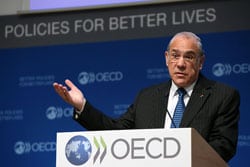TRANSPARENCY -TRADES
Share

OECD releases full version of global standard for automatic exchange of information.
Taking an important step towards greater transparency and putting an end to banking secrecy in tax matters, the OECD today released the full version of a new global standard for the exchange of information between jurisdictions. The Standard for Automatic Exchange of Financial Account Information in Tax Matters calls on governments to obtain detailed account information from their financial institutions and exchange that information automatically with other jurisdictions on an annual basis. The Standard, developed at the OECD under a mandate from the G20, endorsed by G20 Finance Ministers in February 2014, and approved by the OECD Council.
The Standard provides for annual automatic exchange between governments of financial account information, including balances, interest, dividends, and sales proceeds from financial assets, reported to governments by financial institutions and covering accounts held by individuals and entities, including trusts and foundations. The new consolidated version includes commentary and guidance for implementation by governments and financial institutions, detailed model agreements, as well as standards for harmonised technical and information technology solutions, notably a standard format and requirements for secure transmission of data.
“The G20 mandated the OECD to work with G20 and OECD countries and stakeholders toward the development of an ambitious information exchange model that would help governments fight tax fraud and tax evasion,” said OECD Secretary-General Angel Gurria. “Today’s launch moves us closer to a world in which tax cheats have nowhere left to hide.”
The OECD will formally present the Standard to G20 Finance Ministers at their next meeting in Cairns, Australia, on 20-21 September. “Our message will be clear and simple: the automatic exchange of information standard is ready for implementation,” Mr Gurria said.
More than 65 countries and jurisdictions (see list below) have already publicly committed to implementation, while more than 40 have committed to a specific and ambitious timetable leading to the first automatic information exchanges in 2017.
This includes a group of OECD and non-OECD countries which have adhered to the OECD Declaration on Automatic Exchange of Information in Tax Matters as well as a group of early adopters.
More jurisdictions are expected to commit to implement the Standard in the run up to the late-October meeting of the Global Forum Transparency and Exchange of Information for Tax Purposes on which brings together more than 120 countries and jurisdictions, to be held in Berlin and hosted by the German Ministry of Finance. At this occasion a signing ceremony is expected to be held for a new multilateral agreement that activates automatic exchange once legislation and other conditions are in place. Assistance will be available to support less developed countries, so they benefit from this move towards a more transparent tax environment, and international organisations are ready to co-operate to support these countries.
Even before the Standard has become operational, the drive toward greater transparency and better exchange of information is having a tangible effect on taxpayer behaviour. OECD analysis of voluntary disclosure programmes since 2009 shows that more than half a million taxpayers have voluntarily disclosed income and wealth hidden from their tax authorities. Countries have identified more than EUR 37 billion from voluntary disclosure programmes which OECD encourages countries to consider.
Against this backdrop, the OECD is updating policy guidance in this area, contained in a 2010 report, “Offshore voluntary disclosure: comparative analysis, guidance and policy advice”.
The OECD invites public comments on how the framework for voluntary disclosure could be further improved and what particular features might encourage even more taxpayers to come forward and take advantage of such programmes. Comments should be sent to WP10@oecd.org no later than 12 September 2014.
Countries and jurisdictions publicly committed to implementation of Automatic Exchange of Information:
Andorra, Anguilla, Argentina, Australia, Austria, Belgium, Bermuda, Brazil, British Virgin Islands, Bulgaria, Canada, Cayman Islands, Chile, People’s Republic of China, Colombia, Costa Rica, Croatia, Cyprus, Czech Republic, Denmark, Estonia, Faroe Islands, Finland, France, Germany, Gibraltar, Greece, Guernsey, Hungary, Iceland, India, Indonesia, Ireland, Isle of Man, Israel, Italy, Japan, Jersey, Korea, Latvia, Liechtenstein, Lithuania, Luxembourg, Malaysia, Malta, Mexico, Montserrat, Netherlands, New Zealand, Norway, Poland, Portugal, Romania, Russian Federation, Saudi Arabia, Singapore, Slovak Republic, Slovenia, South Africa, Spain, Sweden, Switzerland, Turkey, Turks & Caicos Islands, United Kingdom, and United States, and the European Union.

























